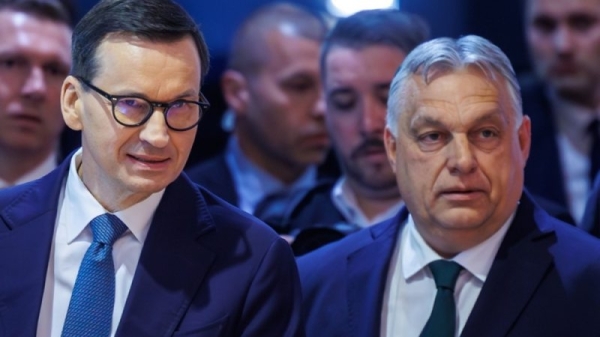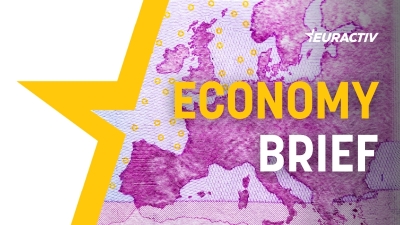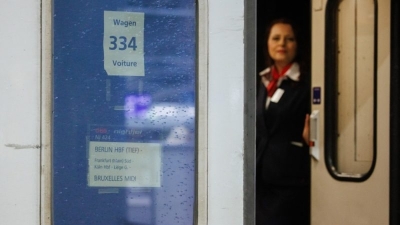Morawiecki, Orbán plot reshuffle in EU Parliament with Le Pen

Hungarian Prime Minister Viktor Orbán and former Polish prime minister Mateusz Morawiecki, members of the right-wing ‘national-conservative’ camp, are planning a reshuffle of powers in the European Parliament in an attempt to gain enough leverage in the next term.
Although working with Marine Le Pen is not ruled out, her party’s exact positioning in the new balance remains unclear, while Italian Prime Minister Giorgia Meloni will be the ultimate dealmaker.
With June’s EU elections looming and a boosted national-conservative ECR group and far-right ID, Orbán’s party, Fidesz, is considering which faction to join after they left the centre-right EPP in 2021.
“The current structure is not good: national conservative forces are taking the lead in the polls, and they don’t have a proper voice in the European Parliament”, Balázs Orbán, Viktor Orbán’s political director, told Euractiv.
“So we need to create an environment where national conservative forces are much more heard on the European stage as well,” he said, taking a dig at the current formations of ID, ECR and their national delegations, which, he said, became an ineffective counter force to “federalist” parties when the UK and its “sovereigntists” forces left the EU.
Asked by Euractiv if Fidesz would join ECR, his political director answered, “We have many options,” including joining ECR, ID, or forming a new group, not discarding the idea of “written documents” when coalition building.
Reviewing ‘organisational options’ not to lose members
But Orbán will need to convince former Polish prime minister and leader of Law and Justice (PiS/ECR) Mateusz Morawiecki and Italian Prime Minister Giorgia Meloni (Fratelli d’Italia/ECR) if he wants to join ECR.
“I can tell you that I have a very good feeling with my colleagues from Fidesz, I know that Giorgia Meloni and Viktor Orbán have a good relationship”, Morawiecki said when interviewed by Euractiv.
“We want our group to be significantly bigger (…) through maybe attracting other parties like Fidesz,” he added.
However, some national delegations, such as Czechia’s ODS and the Sweden Democrats, have threatened to quit the group over Fidesz, mainly because they disagree over the Hungarians’ approach to Ukraine.
While confirming that internal discussions are ongoing, Morawiecki said all ECR members must be on board for such a decision, adding that he thinks there are “organisational options” that would allow the group to expand without shedding members.
The Le Pen question
While Meloni’s reaction to Orbán’s plans to join ECR is unknown, a key issue driving Morawiecki and Meloni apart is how close they want to be to Marine Le Pen’s Rassemblement National.
From his side, Morawiecki argued Le Pen could be key to securing the leverage of right-wing nationalist forces in the next Parliament. He favoured closer ties, though he rejected a complete merger between ECR and ID due to vast differences between national delegations’ stances on key policy issues such as support for Ukraine, vouching to collaborate with “some” delegations instead.
“There are also other parties, which are part of the ID group, which can expand our capacity to negotiate the future coalition, including Marine Le Pen.”
When asked about the “cordon sanitaire” currently enforced on ID, according to which centrist forces do not collaborate with them to block far-right ideas, he foresaw Le Pen’s potential election as the next French president and said, “Try to put a cordon sanitaire around the French President. I wish you well.”
However, he refused to comment on the possibility of working with Germany’s AfD, also an ID member.
Also read: German, French far-right clash again – this time over Mayotte’s status
While Le Pen joining ECR would be a thorn in the latter’s newly founded relationship with Éric Zemmour’s Reconquête —as both parties are national competitors—Morawiecki downplayed rifts, arguing that “in politics, disagreement on something does not exclude some broader consensus.”
Meanwhile, Balazs Orbán also affirmed that Fidesz is ready to collaborate closely with Le Pen, as they share a vision of an EU of nation-states and the drive to reform it.
Meloni torn between centre and right
The ultimate decision, however, will come from Rome, with Fratelli d’Italia (FdI) and Meloni widely regarded as leading the EU’s right wing.
Nicola Procaccini, ECR co-chair and FdI member told Euractiv that FdI is determined to work with the centre-right European People’s Party (EPP) and ID forces in the European Parliament to transpose the “Italian model” to the EU level.
The current Italian governing coalition is formed by the centre-right (EPP), national-conservative party Fratelli d’Italia (ECR) and far-right Lega (ID).
That said, FdI has veered towards being a constructive force with the traditional coalition, which is made up of the centre-right EPP, liberal Renew, and the Socialists and Democrats (S&D), such as by voting in favour of the Asylum and Migration Pact.
For that reason, “not all the ID delegations could be part of a centre-right coalition [in the Parliament] but many, I think, yes,” Meloni’s right hand in Brussels added.
While Meloni wants to collaborate with Lega (ID), FdI also seeks close collaboration with the centre-right EPP, making close ties with Fidesz and ID parties a thorny issue.
EPP Secretary General Thanasis Bakolas recently told Euractiv that the EU centre-right is open to collaborating with the “healthy parts” on the right and “helping them distinguish themselves from the far right” as long as they respect the red lines: pro-Europe, pro-NATO, pro-Ukraine.
But this will take time, he said.
[Edited by Kjeld Neubert / Aurélie Pugnet/ Alice Taylor]
Read more with Euractiv




